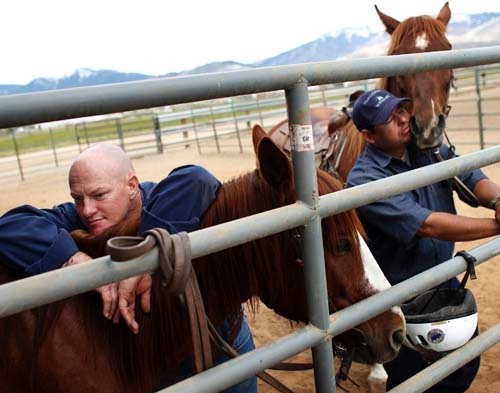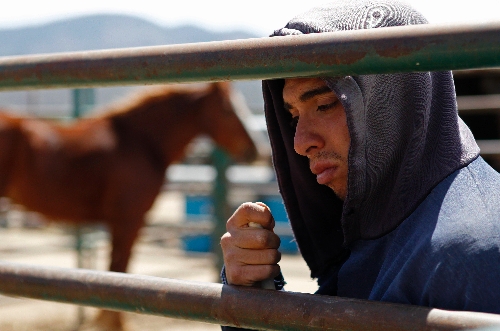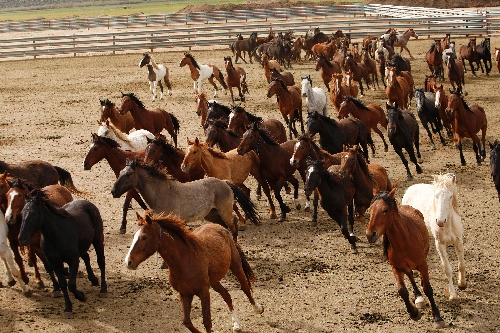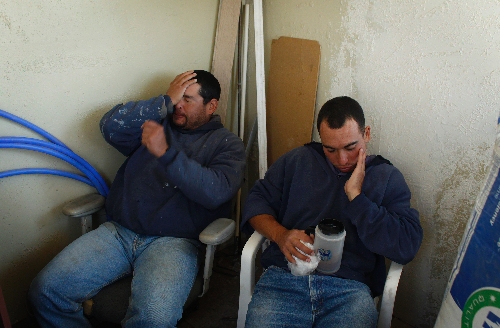Convict cowboys train horses, seek redemption at Nevada camp
The mustang bolted, a thousand pounds of muscle, speed and sudden fear. He slammed full force into the corral's metal fence, a bone-jarring clap.
Nowhere to go. Nowhere to hide. No escape.
He turned to face his foe. In six years of freedom, the horse had rarely been so close to a man.
"He was one of the wildest horses," recalled the man, German Lechuga. "I always get the wildest ones. I guess I'm pretty wild myself, so we get along just fine."
Inmate #1027431 met horse #8266 in midwinter at a minimum-security prison camp outside Carson City. The site lies in a valley below the rising Sierra Nevada range. It's a quiet corner, seasonally swept by fall winds, slashing snow, spring rain and a scorching desert sun.
The man and horse would work together five days a week, seven hours a day for 120 days, often inside an 80-foot-by-80-foot covered arena with more than a dozen other inmate riders and wild mounts.
Lechuga would gentle the horse until he could be saddle-ridden but not fully tamed. Green broke, they call it. In turn, the horse gentled the man, teaching him patience as they gained a trust neither had likely known outside this place.
"I haven't named him yet," Lechuga said in March, one month into training the horse with wary eyes not yet softened into submission. "Some say 'Thunder' cause he's one of the craziest ones."
* * * * * * * * * *
Since 2000, Nevada prisoners such as Lechuga have trained wild horses to be sold at auction to the highest bidder. The Nevada Department of Agriculture started the program to handle estrays, the old English term for animals found wandering, whether wild or discarded by their unknown owners.
Now, the program here at Stewart focuses on wild horses gathered in Nevada, California and other Western states by the Bureau of Land Management. That agency is responsible for protecting tens of thousands of mustangs under a federal law passed in 1971.
It's the most successful part of the BLM program to adopt out, care for and control the wild horse population in 10 Western states. An estimated 38,000 mustangs roam the ranges -- half in Nevada -- and 40,000 are kept in short- or long-term holding, including on grasslands across the Midwest. More than 3,000 wild horses are adopted by people each year nationwide, most not ready to ride.
The first U.S. prison horse training program began in Canon City, Colo., in 1986 after the BLM had trouble adopting out 15,000 newly gathered mustangs at $125 a head. Buyers found them unmanageable. Unemployed inmates could be trained to tame the animals first, it was agreed.
Thus the convict cowboy was born.
Then the unexpected happened: Both captive man and beast were becalmed.
"Inmates learned to care and trust," said a 2003 paper published in the American Behavioral Scientist. The research also concluded those prisoners were less likely to return to prison.
Lechuga, 21, reflects some of that.
"This is just a time out," he said. "This is not a life for me."
Once an out-of-control drinker with a fast car and faster life, Lechuga is halfway through a term of at least four years for causing an accident while driving drunk in Reno. He said it happened three days before his 19th birthday. To make matters worse, he didn't show up for his first sentencing date.
"I used to have it my way, do what I wanted," said Lechuga, whose days now are dictated by duty. "You can't bully a horse. You got to earn its trust. I always say patience. I'm still working on it."
* * * * * * * * *
Hank Curry gives the tough cases to Lechuga, a top trainer in the program Curry has run for nearly 10 years. A beefy man with a wide cowboy hat, Curry carefully chooses the mustangs and the men.
"I pick a trainer like I do a horse -- with a lot of luck," Curry said. "I look to see if they have intelligent eyes. I look at their behavior. ... I tell them I don't care what you done. If they're honest with me, that carries a lot of weight."
Most trainers are serving time for alcohol or drug offenses. Many are multiple offenders, caught in a cycle of booze- and pill-fueled self-destruction. Some are city slickers. A few are real cowhands.
Ben Robinson, 36, was one of the most experienced, having worked on ranches in Nevada, California, Arizona and New Mexico before he moved to Las Vegas for construction work. He was pouring cement on the glamorous CityCenter project on the Strip and making $25 an hour plus overtime.
"I didn't know what to do with all that money," Robinson said, shaking his head.
So he drank it away, got his third DUI one night and a sentence of 18 to 48 months in prison.
Working around horses again, Robinson appeared at ease. A rough-knuckled man handy with a rope, he's used to dodging flying hoofs trying to knock him into the dirt.
"I'm the king of gettin' bucked off," Robinson said with a shrug. "At least I'm outside all the time. You come out here and they treat you like a human being. It's a lot better than sitting in a cell."
During the spring, he trained a 5-year-old gelding he named "Crossroads." And he began to plan for his post-prison life, looking forward to returning to New Mexico and quieter cowboy ways.
"When you're in prison you have all the time in the world," Robinson said. "You have time to stay with the horse. You don't have to do it the hard way. You have time to let him figure it out for himself."
* * * * * * * * * *
At the camp, an average of 15 inmates prepare at least one horse each for Stewart's thrice-yearly auction. More than 650 horses have been adopted out through the program.
Lechuga and other trainers don't break horses in the old bucking bronco style. Instead Curry teaches them to gentle the mustangs in a modern-day horse whisperer style.
"Most people want to do everything fast," Curry said. "I do everything slow. Some guys have been taught in prison to be tough. They bring that aura with them. I say you have to get rid of that."
For the first couple weeks, man and horse get to know one another -- smells, movements, sounds, demeanors. Scratching poles get the horse used to being touched, then a grooming brush, then a hand.
Before the mustangs arrive here, all they have known is fight or flight, traveling across desert and mountain in family or bachelor bands ranging from several horses to several dozen. They have not felt the pull of a rope, a halter, a blanket, a saddle, let alone the weight of a man on their backs.
Lechuga worked gingerly, introducing himself and his gear before stepping into the stirrups.
"When I whistle, he'll come," he said in March, sitting atop his Bay, a common type characterized by a black mane, ears and legs and a reddish-brown body. "He knows me, but his fear factor is still high."
That instinct for survival has saved the Spanish-blood mustangs from extinction for centuries.
A penchant for personal risk has defined many of their new masters.
Lechuga tells the story of his pre-prison life like a man removed from his former self.
A high school dropout, he became a car salesman at 18. He got a fake ID, drank often, and tested the speed of his 175-horsepower Nissan Altima.
"I didn't value that car," he said. "I was on the path of destruction. I'm lucky I didn't kill anybody."
* * * * * * * * * *
Much like the trapped mustangs they're now charged with taming, few inmates could have imagined they would find themselves without the freedom they had taken for granted.
Jesus Fuentes, a 38-year-old father of two daughters, lived with his wife in Reno. A construction worker, he got the judge to delay his 2-year sentence on drug charges for 14 months so he could finish training as a pipe-fitter and be ready for a new job once he gets out.
"I'm not here because I'm a bad guy," he said. "I got caught up in something I shouldn't have. It happens. I could make excuses. As soon as you accept your responsibility, you just do the time."
Fuentes was popped for selling methamphetamine. He said 80 percent of those on construction sites he has worked either took speed to work longer hours or sold it.
Now, he goes about his days with fresh focus. Like the other trainers, he rises early to start working with the horses at 6:30 a.m. in summer and 7 a.m. in winter. When his workday ends, he showers, eats, watches television and sometimes works out. He's down to 155 pounds from 174 when he arrived.
"I'm awake now, you know?" he said.
He counts himself lucky he has landed the job, which pays from 60 cents to $3 an hour.
"During intake, they put you in a little cell," he recalled. "Over in the regular prison, you shower every two or three days and you're in your cell 18 hours a day. I'm glad I came here."
Fuentes treats the mustangs with loving care, knowing he is giving them a second chance at freedom -- not total as in the wild, but not held in a holding pen for the rest of their lives either.
In the spring he worked with a horse named Chester, a 5-year-old, small at 800 pounds.
"After a week, he just gave in and I could pet him," Fuentes said. "But the second time I got on him, he bucked me off. I forgot to tell him I was there. You have to let him know you're there."
Fuentes spruced up Chester by combing his mane with baby oil, vinegar and water. He braided it into a wavy style before the horse sold at auction for $1,000, a better than average price.
Now, Fuentes ticks down his time by counting horses left to train, three or four more.
"May 29, 2012, is my out date," he said. "That's the date you know."
* * * * * * * * * *
In mid-May, Lechuga, Fuentes and a few other inmates watched with professional curiosity as Curry spent a morning selecting horses for the next round of training.
The smell of hay mixed with choking dust and the tang of sweat from mustangs as a mounted Curry and a couple helpers funneled the nervous animals through a maze of fences into a corral.
The camp was holding about 800 BLM horses at the time, dispersed throughout more than a dozen group pens, ranging from 30 to 400 square feet. Curry had been studying the herds, looking for geldings that were several years old, but no older than five or six.
"You don't want the old horses who are warriors. They're harder to break," he said.
He had his eye on capturing one mare, too, saying, "She's flashy."
As he worked to pick his favorites, a few mustangs, wild-eyed, ears back, nostrils flaring, raced around looking for escape. Other horses followed, herding into a crowd then dispersing once again. Hundreds of hoofs rumbled past, shaking the ground like a low-level earthquake.
"The important thing to know is they'll run right over you," said Curry, wearing a helmet over his cowboy hat. "They're wild like deer. They're wild animals. They don't want to be caught."
At times, Curry sat statue-still in his saddle until the horses calmed. Then he and his crew cut out select mustangs -- one, two, three at a time -- gathering two dozen that appeared adoptable.
"I look for an intelligent head, a softer look in their eye, straight legs, a long hip," Curry said. "The horse needs to be balanced. Some of these horses are like people -- they have a little larceny in 'em."
At moments like these, it's easy to forget the men are prisoners, not ranch hands, until it's time to count heads each day to make sure nobody walked off.
"Well, I guess that's all the fun," Curry said after picking new horses. "I got to do a count."
He rode off, a man in his element, a second cowpoke career after laying carpet for 30 years.
"It's hard to make good money as a cowboy," he explained.
A light rain began to fall, offering a baptism of sorts for the fresh wild horse recruits.
* * * * * * * * * *
The same week the new horses were picked, Lechuga and the other inmates were making final preparations for the May 21 auction of 18 trained mustangs.
Horses that four months ago could not be touched were now trotting prettily around the arena, heads high. On cue, Lechuga made his horse stop, back up and side-step. Dismounting, he circled the gelding and picked up each hoof and examined it with no trouble, no balking, no nervous ticks.
The men drove their steeds through a contraption called "the car wash," hanging hard plastic strips the mustangs ran through, creating a loud rustle that would startle most domestic mounts. They exposed the horses to loud music, hand claps, shouts, sudden movement, waving hands, flags and sticks.
The fear was gone.
"When they trust you, they're not scared of nothing," Lechuga said.
Lechuga even got his mustang to bow his head to the ground like a true show horse. Some inmates slid off the backs of their rides; a couple others stood on saddles like circus performers. They traded horses so the mustangs could get used to different riders. They were nearly ready.
"My grandfather was a cowboy in Mexico," Lechuga said. "The methods for breaking horses were a lot tougher then. Here we try to rewire their heads, sorta like the state tries to rewire us so we can go back out into society. If your horse has a problem, you can't run away from it. You have to fix it."
The prison program pays for itself and saves the BLM money in the long run. It costs about $1,000 to train a horse for adoption compared with about $500 a year to keep a mustang in long-term holding. There are similar programs in Colorado, Wyoming, Kansas and Utah. California had one in the past.
Tim Bryant, ranch manager at Stewart, said the prison doesn't keep statistics to show how successful the program is in discouraging inmates from returning to their old ways and to prison after their release. Anecdotally, though, managers see results, both in job and life training.
"No question, there's a therapeutic value to it. You can see the changes," Bryant said.
Like the mustangs, however, it takes constant work once outside to make it last.
"If you take the horses home and just put them in a corral without working with them and riding them, they'll revert to being wild," Bryant said. "They're still pretty raw."
* * * * * * * * * *
Auction day arrived.
Lechuga wore a freshly pressed blue shirt over his blue jeans and cowboy boots, both donated by wild horse advocates who support the prison program. The saddles were gifts, too, worn yet sturdy.
He had finally come up with a name for his horse: Donald Trump in honor of the New York developer and reality TV show star. The mustang's long black mane hung over its forehead, comb-over style, nearly covering the length of his nose. Truth be told, Lechuga's horse looked a little proud of himself, a touch arrogant, posing for photos with a bearing that bespoke how far he'd come.
The Donald joined a lineup of horses named for various traits. Big 'N weighed in at 1,100 pounds, Straight Shooter liked to pass other horses. Junior was "easy to catch and saddle" and had never bucked. Little B was "eager to learn." Gemini was "easy going and mellow," the Terminator "spirited."
Ranchers looking for a strong work horse and people looking for companionship and a living piece of the American West were among serious buyers sitting in a crowd of more than 150 spectators.
The camp also has trained horses for the Las Vegas Metropolitan Police Department Mounted Unit and the U.S. Marine Corps Winter Warfare Facility, and is working on a deal with the U.S. Border Patrol as well.
The bidding started at $150. A few didn't sell. The lowest price was $200, the highest $2,300. The record auction price ever was $8,500, paid by Curry, whose wife had her eye on a particular mustang.
Karl Johnson, a fifth-generation cattle rancher from Bakersfield, Calif., bought three, paying $800, $1,000 and $2,000, a pretty fair bargain. His family already owned three wild horses that had become the hardiest and most reliable animals working his land, he said.
"You can go all day on these horses," Johnson said. "And you can take 'em anywhere."
He bought Straight Shooter and Boss Hawg for himself and General Lee for his daughter, Roselle Wreden. With her husband, she works her own cattle ranch that's part of the family spread.
"The country is rough and these horses almost take care of themselves," she said. "You can tell how gentle they are by looking in their eyes. If they want to be with you, they're willing to work."
* * * * * * * * * *
Donald Trump sold for $1,200 to Willis Lamm, a wild horse advocate who owns a horse training outfit in Stagecoach. He has helped the BLM find homes for mustangs and makes his living saving and taming wild horses that don't go through the prison program.
"Donald Trump is going to be my poster horse for training," he said.
After getting him home, Lamm renamed the horse "Trooper," since he came from a band gathered at Twin Peaks, Calif., where the U.S. military once bought mustangs for its cavalries. He said he knew Lechuga's horse was one of the wildest and had tried to break through fences.
"He was really self-destructive when he first came in," Lamm said. "But look at him now. Wild horses are social animals. They'll bond with a chicken if nobody else is around."
On auction day, Lechuga proudly displayed the transformation as the sale got under way. He and his horse carried the American flag, leading a parade of mustangs as they raced around the arena in formation, weaving in and out. The crowd rose to its feet with the crackle of applause.
Horse tail flying, U.S. colors whipping in the wind, man and mustang had became one.
"We're helping the horses and they're helping us," Lechuga said. "We teach the horses to be gentle. We give them a fresh start. And we get a second chance, too."
Lechuga earned his GED certificate while in prison. He said he thinks he has the skills to become a horse trainer, yet he's not sure whether he would be satisfied with that sort of spare lifestyle.
"I like money too much," he said, sounding green broke, not fully tamed. "I don't know if I can go back to selling cars. I like the commissions but that could be my downfall. I hope not.
"When I get out, I've got to gain the trust of the community. I'm an ex-felon now. I've got to redeem myself."
Contact Laura Myers at lmyers@reviewjournal.com or 702-387-2919.




















